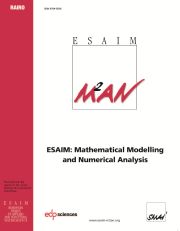Crossref Citations
This article has been cited by the following publications. This list is generated based on data provided by
Crossref.
Chilton, Ryan A.
and
Lee, Robert
2007.
Conservative and Provably Stable FDTD Subgridding.
IEEE Transactions on Antennas and Propagation,
Vol. 55,
Issue. 9,
p.
2537.
Kanevsky, Alex
Carpenter, Mark H.
Gottlieb, David
and
Hesthaven, Jan S.
2007.
Application of implicit–explicit high order Runge–Kutta methods to discontinuous-Galerkin schemes.
Journal of Computational Physics,
Vol. 225,
Issue. 2,
p.
1753.
Montseny, E.
Pernet, S.
Ferriéres, X.
and
Cohen, G.
2008.
Dissipative terms and local time-stepping improvements in a spatial high order Discontinuous Galerkin scheme for the time-domain Maxwell’s equations.
Journal of Computational Physics,
Vol. 227,
Issue. 14,
p.
6795.
Ern, A.
Piperno, S.
and
Djadel, K.
2008.
A well‐balanced Runge–Kutta discontinuous Galerkin method for the shallow‐water equations with flooding and drying.
International Journal for Numerical Methods in Fluids,
Vol. 58,
Issue. 1,
p.
1.
Diaz, Julien
and
Grote, Marcus J.
2009.
Energy Conserving Explicit Local Time Stepping for Second-Order Wave Equations.
SIAM Journal on Scientific Computing,
Vol. 31,
Issue. 3,
p.
1985.
El Soueidy, Ch. P.
Younes, A.
and
Ackerer, P.
2009.
Solving the advection–diffusion equation on unstructured meshes with discontinuous/mixed finite elements and a local time stepping procedure.
International Journal for Numerical Methods in Engineering,
Vol. 79,
Issue. 9,
p.
1068.
Catella, Adrien
Dolean, Victorita
and
Lanteri, Stéphane
2010.
An implicit discontinuous Galerkin time‐domain method for two‐dimensional electromagnetic wave propagation.
COMPEL - The international journal for computation and mathematics in electrical and electronic engineering,
Vol. 29,
Issue. 3,
p.
602.
Dolean, Victorita
Fahs, Hassan
Fezoui, Loula
and
Lanteri, Stéphane
2010.
Locally implicit discontinuous Galerkin method for time domain electromagnetics.
Journal of Computational Physics,
Vol. 229,
Issue. 2,
p.
512.
Bouquet, A.
Dedeban, C.
and
Piperno, S.
2010.
Discontinuous Galerkin time‐domain solution of Maxwell's equations on locally refined grids with fictitious domains.
COMPEL - The international journal for computation and mathematics in electrical and electronic engineering,
Vol. 29,
Issue. 3,
p.
578.
Fahs, Hassan
Fezoui, Loula
Lanteri, Stéphane
Dolean, Victorita
and
Rapetti, Francesca
2010.
Recent Achievements on a DGTD Method for Time-Domain Electromagnetics.
IEEE Transactions on Magnetics,
Vol. 46,
Issue. 8,
p.
3061.
Grote, Marcus J.
and
Mitkova, Teodora
2010.
Explicit local time-stepping methods for Maxwell’s equations.
Journal of Computational and Applied Mathematics,
Vol. 234,
Issue. 12,
p.
3283.
Godel, Nico
Schomann, Steffen
Warburton, Tim
and
Clemens, Markus
2010.
GPU Accelerated Adams–Bashforth Multirate Discontinuous Galerkin FEM Simulation of High-Frequency Electromagnetic Fields.
IEEE Transactions on Magnetics,
Vol. 46,
Issue. 8,
p.
2735.
Ezziani, Abdelaâziz
and
Joly, Patrick
2010.
Local time stepping and discontinuous Galerkin methods for symmetric first order hyperbolic systems.
Journal of Computational and Applied Mathematics,
Vol. 234,
Issue. 6,
p.
1886.
Schomann, S.
Godel, N.
Warburton, T.
and
Clemens, M.
2010.
Local Timestepping Techniques Using Taylor Expansion for Modeling Electromagnetic Wave Propagation With Discontinuous Galerkin-FEM.
IEEE Transactions on Magnetics,
Vol. 46,
Issue. 8,
p.
3504.
Busch, K.
König, M.
and
Niegemann, J.
2011.
Discontinuous Galerkin methods in nanophotonics.
Laser & Photonics Reviews,
Vol. 5,
Issue. 6,
p.
773.
Dolean, Victorita
Fahs, Hassan
Fezoui, Loula
and
Lanteri, Stéphane
2011.
Spectral and High Order Methods for Partial Differential Equations.
Vol. 76,
Issue. ,
p.
163.
Jue Wang
Dosopoulos, S.
Beig, Davood Ansari Oghol
Zhen Peng
and
Jin-Fa Lee
2011.
High order parallel discontinuous Galerkin time domain method with curvilinear element and continuously varying material properties for Maxwell's equations.
p.
3261.
Schnepp, S.
and
Weiland, T.
2011.
Discontinuous Galerkin methods with transient hp adaptation.
Radio Science,
Vol. 46,
Issue. 5,
Lanteri, Stephane
2011.
Some recent developments of the DGTD method with practical applications.
p.
1.
Fahs, H.
2011.
Improving accuracy of high-order discontinuous Galerkin method for time-domain electromagnetics on curvilinear domains.
International Journal of Computer Mathematics,
Vol. 88,
Issue. 10,
p.
2124.




